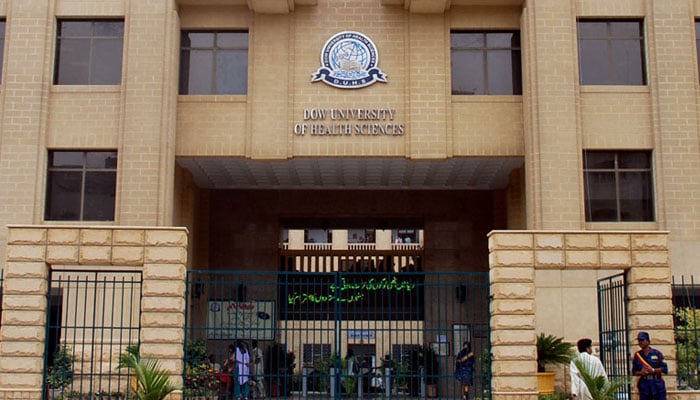Telemedicine facility for diabetic patients launched at Dow varsity
Emphasising the need for using technology in the diagnosis and treatment of diabetes in Pakistan, Dow University of Health Sciences (DUHS) Vice Chancellor (VC) Prof Saeed Quraishy on Saturday said that besides its challenges, the Covid-19 pandemic had provided an excellent opportunity to maximise the use of telemedicine in reaching out to patients who were still undiagnosed but suffering due to lifestyle diseases and conditions like diabetes mellitus.
“Prevalence of diabetes in Pakistan is said to be 17.1 per cent, which means that there are around 19 to 20 million living with diabetes. Unfortunately, a vast majority of them are undiagnosed and living in rural and far flung areas of the country. The only way to approach these undiagnosed diabetics is by the use of technology, especially telemedicine,” Prof Quraishy said while inaugurating the first E-Tibb telemedicine clinic at the DUHS Ojha campus.
The E-Tibb Telemedicine clinic has been established at the National Institute of Diabetes and Endocrinology (NIDE) in collaboration with a local pharmaceutical firm that has provided technological services, computing hardware and mobile phone application as well as other resources to the varsity to reach out to millions of diabetics in Sindh, Balochistan and other parts of the country, who cannot travel to Karachi on a regular basis to consult experts and physicians.
Prof Quraishy maintained that there were many undiagnosed patients of diabetes in the country and often surgeons, including him, had to postpone their surgeries after it emerged that their blood sugar level was as high as 500mg/dL. “Our country is facing an epidemic of diabetes and there is a need to control it by using all the means and resources we have at our disposal including technology,” he said.
“There is a need to educate patients about use of technology for their benefits. A large number of people are using modern cell phones with internet facility but they need to learnt about using it for their benefits, especially in diagnosis and treatment of diseases.”
The DUHS VC also asked the media to highlight the importance of technology for improving health and well-being of the people.
Lauding the inauguration of the E-Tibb facility at the NIDE, Prof Quraishy said it was the first clinic of its kind in the country that would benefit thousands of diabetics who would be consulting expert physicians through their mobile phones. He added that the Dow University would soon resume telemedicine clinics at its other departments.
NIDE Director Prof Akhtar Ali Baloch said that in its initial days, the Covid-19 pandemic had created immense hardships for people living with non-communicable diseases (NCDs), especially diabetes, as patients could not approach health facilities and see their consultants but now with the help of telemedicine, they could talk to consultant diabetologists while sitting at their homes and get advised on managing their blood sugar levels with the help of medicines and lifestyle modification.
Prof Baloch said consultants would give at least half an hour to each patient through the telemedicine facility to properly educate and satisfy them.
He maintained that patients from rural areas of Sindh and far flung cities and towns of Balochistan had to spend thousands of rupees to reach Karachi, stay at hotels, spend money on consultation and medicines, and travel back to their homes but now with the help of telemedicine, they could get treatment at their doorsteps.
-
 BTS Moments Of Taylor Swift's 'Opalite' Music Video Unvieled: See Photos
BTS Moments Of Taylor Swift's 'Opalite' Music Video Unvieled: See Photos -
 Robin Windsor's Death: Kate Beckinsale Says It Was Preventable Tragedy
Robin Windsor's Death: Kate Beckinsale Says It Was Preventable Tragedy -
 Rachel Zoe Shares Update On Her Divorce From Rodger Berman
Rachel Zoe Shares Update On Her Divorce From Rodger Berman -
 Kim Kardashian Officially Takes Major Step In Romance With New Boyfriend Lewis Hamilton
Kim Kardashian Officially Takes Major Step In Romance With New Boyfriend Lewis Hamilton -
 YouTube Tests Limiting ‘All’ Notifications For Inactive Channel Subscribers
YouTube Tests Limiting ‘All’ Notifications For Inactive Channel Subscribers -
 'Isolated And Humiliated' Andrew Sparks New Fears At Palace
'Isolated And Humiliated' Andrew Sparks New Fears At Palace -
 Google Tests Refreshed Live Updates UI Ahead Of Android 17
Google Tests Refreshed Live Updates UI Ahead Of Android 17 -
 Ohio Daycare Worker 'stole $150k In Payroll Scam', Nearly Bankrupting Nursery
Ohio Daycare Worker 'stole $150k In Payroll Scam', Nearly Bankrupting Nursery -
 Michelle Yeoh Gets Honest About 'struggle' Of Asian Representation In Hollywood
Michelle Yeoh Gets Honest About 'struggle' Of Asian Representation In Hollywood -
 Slovak Fugitive Caught At Milano-Cortina Olympics To Watch Hockey
Slovak Fugitive Caught At Milano-Cortina Olympics To Watch Hockey -
 King Charles Receives Exciting News About Reunion With Archie, Lilibet
King Charles Receives Exciting News About Reunion With Archie, Lilibet -
 Nvidia Expands AI Infrastructure With Nevada Data Centre Lease
Nvidia Expands AI Infrastructure With Nevada Data Centre Lease -
 Royal Family Shares Princess Anne's Photos From Winter Olympics 2026
Royal Family Shares Princess Anne's Photos From Winter Olympics 2026 -
 Tori Spelling Feels 'completely Exhausted' Due To THIS Reason After Divorce
Tori Spelling Feels 'completely Exhausted' Due To THIS Reason After Divorce -
 SpaceX Successfully Launches Crew-12 Long-duration Mission To ISS
SpaceX Successfully Launches Crew-12 Long-duration Mission To ISS -
 PlayStation State Of Play February Showcase: Full List Of Announcements
PlayStation State Of Play February Showcase: Full List Of Announcements




